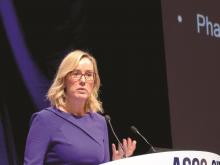ORLANDO – In patients with advanced cervical cancer, combining chemotherapy with a vaccine against human papillomavirus (HPV) type 16 resulted in a robust, T-cell–mediated immune response and long duration survival for a large proportion of patients, reported investigators from the Netherlands.
Patients with advanced, HPV16-positive cervical cancer who were treated with standard chemotherapy and vaccinated with HPV16 synthetic long peptides (HPV16-SLP) had substantially increased T-cell responses, and these responses correlated with survival, said Marij Welters, PhD, from Leiden (the Netherlands) University Medical Center.
“Induction with the combination of the vaccine with chemotherapy results in very strong T-cell response against HPV16 E6/E7 [proteins], and this was associated with improved clinical outcome,” she said at the ASCO-SITC Clinical Immuno-Oncology Symposium, jointly sponsored by the American Society of Clinical Oncology and the Society for Immunotherapy of Cancer.Data from this study provide “a strong rationale to conduct a randomized phase II trial in which a combination with checkpoint inhibitors might be attractive,” she added.
Combination required
Although therapeutic vaccination with HPV16-SLP has been shown to evoke T-cell–mediated shrinkage of HPV16-induced cervical neoplasia, the investigators found in a previous study that vaccination did not result in either tumor regression or prolonged progression-free survival of patients with advanced or recurrent HPV16-induced cervical cancer.
In the phase I trial reported here, the investigators explored whether combination HPV16-SLP with chemotherapy could potentiate T-cell responses.
In a second study, Welters et al. also showed that vaccination with HPV16-SLP after the second round of chemotherapy, when myeloid cells were at their nadir, resulted in robust T-cell responses in both mice and humans.
In the phase I trial reported here, the authors reported on the feasibility and efficacy of the technique in a larger cohort of patients with late-stage, HPV16-positive cervical cancer.
The investigators enrolled cohorts of 12 patients each and delivered one HPV16-SLP vaccine dose 2 weeks after the second, third, and fourth cycles of a total of six chemotherapy cycles with carboplatin and paclitaxel. The vaccine was test dosed at levels of 20, 40, 100, and 300 mcg/peptide, with or without 1 mcg/kg of pegylated interferon-alpha at each peptide dose level. The peptides covered the length of the HPV16 E6 and E7 proteins.
“Upon vaccination, we see a very strong T-cell response induced by the vaccine,” Dr. Welters said.
They also tested general immune responses to various microbial antigens and saw no significant differences in responses among the various dose cohorts.
Early response data was available for a total of 59 patients, 35 of whom received the vaccine/chemotherapy combination as first-line therapy and 24 of whom received it in the second line.
Two of the first-line patients had a complete response, as did one patient who received the combination as second-line therapy. Respective rates of partial responses were 22 and 5, stable disease was seen in 9 and 13 patients, and disease progression in 2 and 5 patients.
The overall response rate for patients treated in the first line was 69%, and the combined overall response and stable-disease rates were 94%. Among patients treated in the second line, the respective rates were 25% and 79%.
Median overall survival (OS) from the time of the first chemotherapy dose was 16.8 months among the first-line patients vs. 7.9 months among second-line patients (P = .0110)
At the data cutoff, median OS had not been reached for the two highest peptide dose levels (100 and 300 mcg).
The investigators also found that OS was independent of general immune status among the patients, suggesting that the benefit was derived specifically from induced T-cell responses.
‘Provocative and promising’
Invited discussant Heather McArthur, MD, MPH, from Cedars-Sinai Medical Center, Los Angeles, called the finding “provocative and promising.”
She said that the most interesting finding from the study may have been that the effect of the vaccine/chemotherapy combination was independent of general immune status.“So, it doesn’t matter if your immune system is suppressed overall. It’s the quality of players on the field and the focus and specificity of those players that matter, and that’s what they were able to demonstrate, which I think is incredibly powerful,” she said.
She noted, however, that although safety was listed as a study endpoint, Dr. Welters did not provide data on toxicities.
The trial was supported by the Dutch Cancer Society and ISA Pharmaceuticals BV. Dr. Welters reported no conflicts of interest. Dr. McArthur has previously disclosed participation in advisory boards for Celgene, Merck, Spectrum Pharmaceuticals, OBI Pharma, Peregrine Pharmaceuticals, and Syndax Pharmaceuticals, and research support from Bristol-Myers Squibb, MedImmune/AstraZeneca, Eli Lilly, ZIOPHARM Oncology, and Merck.



